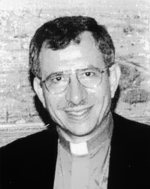
In this season of peace on earth we thought you'd enjoy these helpful words from the Evangleical Lutheran Bishop of Jerusalem, a new friend of the Glendora WCG.
Bishop Younan is a graduate of the Al-Ahila College in Ramallah and head of the Evangelical Lutheran Church in Jerusalem. This article originally appeared in Fuller Seminary's Spring, 2001 "Theology, News and Notes."
By Munib A. Younan

Jerusalem, Israel: The role of the Palestinian church is to be a minister of reconciliation. Palestinian Christians have a prophetic role in reconciliation in which we teach forgiveness, equal coexistence, equity and mutual recognition of the rights of others. With all humility, our Evangelical Lutheran Church in Jerusalem is doing that work of peace education in our schools and congregations. We have exchanges between some of our schools and Jewish schools.
We have also initiated dialogue among the three religions. As I preached in one of the synagogues to 140 rabbis, I did not come to blame, I came to seek the ways and means for a good future for our children.
We do that out of our conviction that the church in Jerusalem in the third millennium is called to be a catalyst of just peace, to be bridge builders of confidence between the two nations – namely, Israelis and Palestinians – and the three religions. Our church in Jerusalem is called to be a catalyst of peace education and ministers of reconciliation in spite of all the difficulties we face.
Christian-Muslim relations are, in general, quite healthy. In recent years we have witnessed the politicization of Islam by different groups. This has left Arab Christians in a difficult position, questioning where they stand and how they relate to Muslims and Islam in our immediate context. We need to insist on a continuous relationship between Christians and Muslims that is open and frank, based on ongoing dialogue.
As Palestinian Christians, we have a dual role. First, we must dialogue with our own society on existential issues. Second, we need to teach the North and the South the art of understanding Islam and what it means to coexist with Muslims. As Palestinians in the new millennium, we want to be the voice of Islam to those in the West and we want to be their voice to Islam.
The Israeli-Palestinian conflict is not a religious conflict, but a conflict over land. The successive agreements have really spoken of the return of the land. The final status will not succeed, however, if it is not accompanied by economic growth.
The core problem of the Palestinian-Israeli conflict is the Palestinian cause. If this is not solved, no stable peace will be achieved. For this reason, the two-states solution – living justly, equally, equitably and peacefully – is the only solution for real peace.
The status of Jerusalem must also be solved in a just way. The only solution is a shared Jerusalem for the two nations as well as for the three religions – namely, Judaism, Christianity and Islam. There will be no peace in the Middle East without a just peace in Jerusalem and for Jerusalem.
In the biblical text it referred to both the forgiveness of debilitating debts and the release of enslaved labor. The World Council of Churches, the Vatican, the Lutheran World Federation and other world communities have called for the liberation of poorer nations from the burden of unpayable debts. The continuation of paying high interest to the World Bank, or the International Monetary Fund and others, is creating unbearable situations. It is widening the gap between the well-developed countries and the South. In keeping with the realism of Jubilee (the biblical pattern of debt being cancelled every fifty years – see Leviticus 25), this is more reform from above than revolution from below.
The 13 churches in Jerusalem are exerting a major effort on issues that need to be clarified. There are four families of the church in the Middle East. They are the Eastern Orthodox, Oriental Orthodox, Catholics and evangelicals (Protestants). Our members are 2 percent of the total population. Our history has taught us to live together and witness together despite the doctrinal differences we have.
The average age of Christians in the Holy Land is 32 years of age, which is double the average age of Palestinians in general. Our fears are that our churches will become museums. [Yet] we celebrate the festival of our countryman, our Savior. He still lives in his Christian Palestinian church. Since the first Christian celebration of Pentecost, Palestinian Christianity has existed. If you read Acts 2:11, it is written that "Cretes and Arabs in our own languages, we hear them speaking about God's deeds of power."
We are called to assume a prophetic role at this time of history where God destined us to be. We need your prayers.